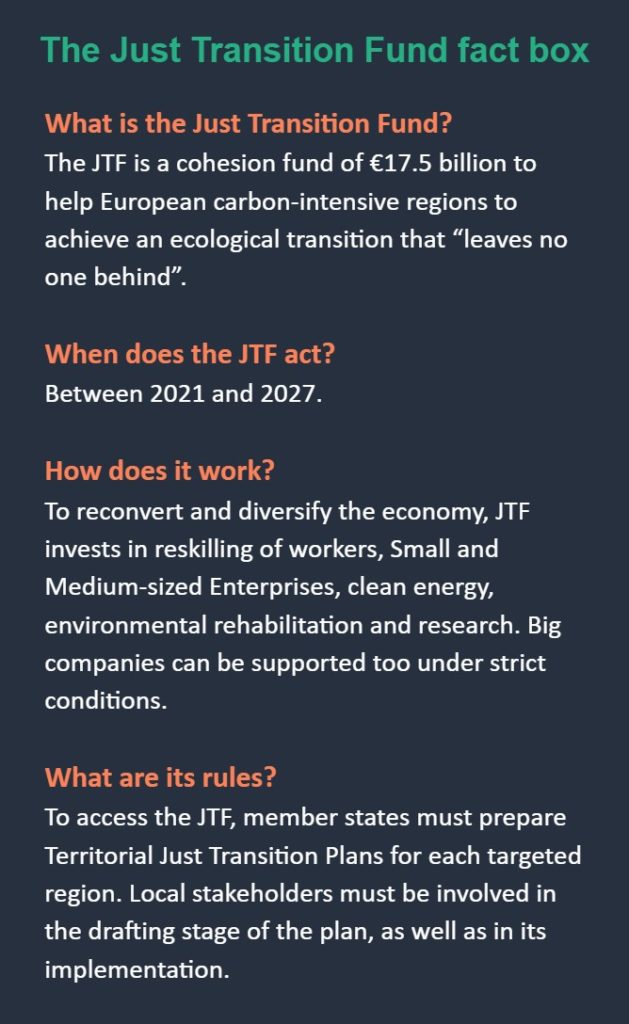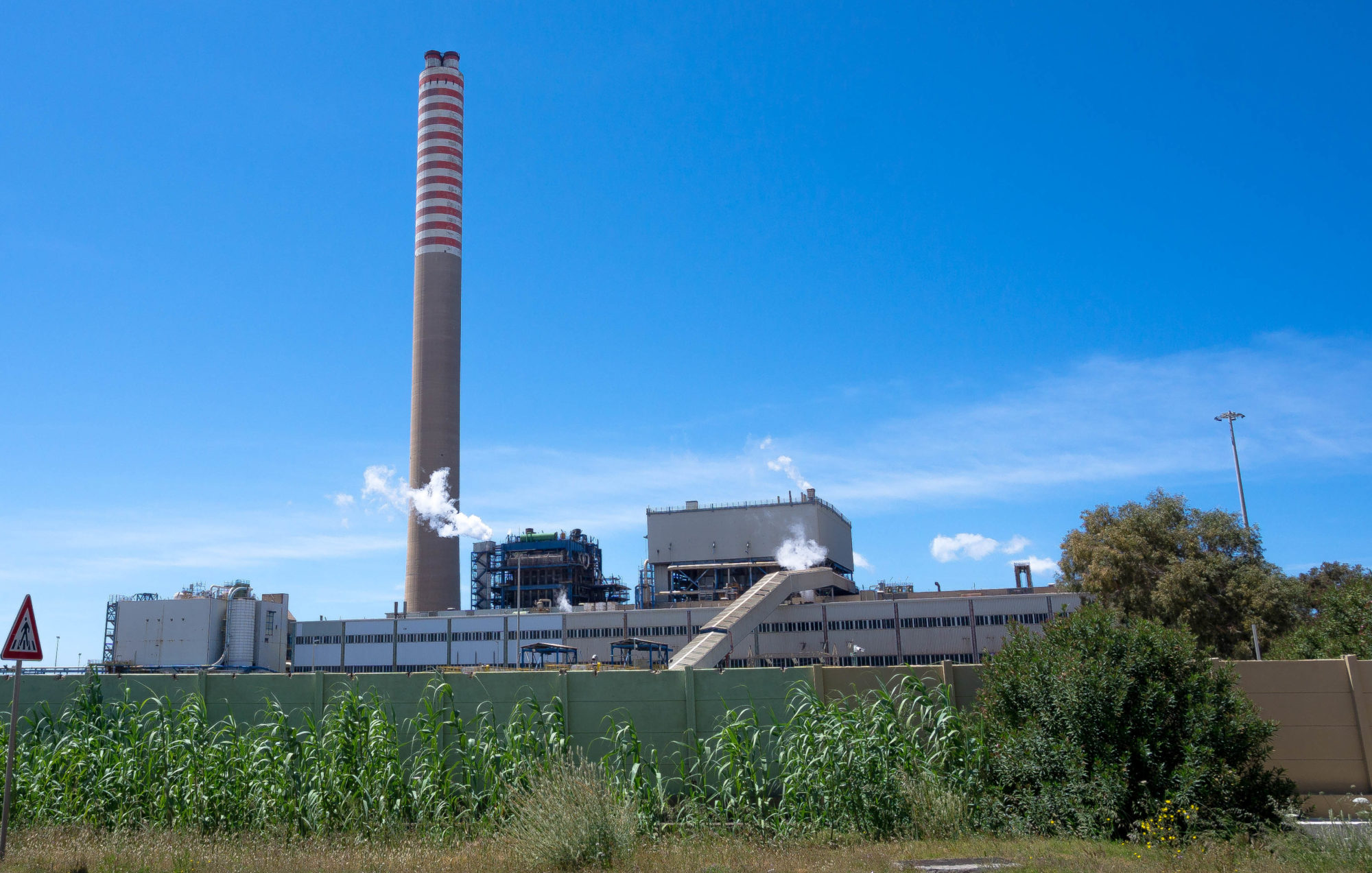Article by: Alva Rosengren, Angèle Duplouy, Athanasia Dordokidou, Matteo Scannavini, Mireia Jimenez Barcelo

The European Union’s Just Transition Fund (JTF) is spreading €17.5 billion to help carbon-intensive regions implement a fair and sustainable ecological transition by 2027.
However, despite the EU Commission’s efforts to provide technical assistance, delays and difficulties accessing the funds by Small and Medium Enterprises (SMEs) still happen around Europe, creating uncertainties about the future of the workers and companies in these regions. Our international team investigated the implementation of the JTF in regions of seven different countries: France, Germany, Greece, Italy, Poland, Spain, and Sweden. The investigation includes both favourable examples, as demonstrated by Sweden, and less successful instances, exemplified by Greece. By covering diverse parts of Europe, we aimed to provide a well-informed picture of the situation at hand.
Francisco Barros Castro, cabinet expert of the European Commissioner for Cohesion and Reforms Elisa Ferreira, recognized that “There is a risk [for SMEs] because EU funds are not easy to access. EU rules are complicated”, explaining their complexity as a result of the negotiation between multiple European institutions. In addition to strict regulations, JTF implementation is already running late in some countries due to lack of planning, time to propose projects and too much bureaucracy.
Our team interviewed local bodies and stakeholders in seven different European countries who shared the challenges their regions are facing due to the ambitious Just Transition.
A race against the clock
All member states must prepare Territorial Just Transition Plans (TJTPs) to access the fund and comply with the regulations established by the European Parliament and Council of Europe. While Bulgaria is the only member state which lost part of its JTF budget (€98 million) due to not having a TJTP yet, Italy and Spain finalised last-minute their plans in December, the last available month to do so.
In southwestern Sardinia (Sulcis), the JTF is late and stopped by bureaucracy. In this territory, the metallurgic pole of Portovesme suffered an employment crisis in the last decade, which is getting worse due to the rise of energy prices and the approach of the coal phase-out. The power plant of Enel Grazia Deledda, fueling metal production in the district, plans to close by the end of 2025, causing between 400 and 1.200 job losses. Despite €367 million of JTF investment, the workers’ future is still unclear, which caused several protests in the last months. “Sulcis has a very low income per capita, probably one of the lowest in Italy, and everything is starting to shut down. If the power plant dies too, it is really over” commented the employee of Enel Marco Pisu.

Local mayors are concerned too, since past bureaucracy and bad management already wasted millionaire investments aimed to help Sulcis. Mauro Usai, the mayor of Iglesias, the biggest municipality of Sulcis, is concerned this will happen again with the €367 million of the JTF. “There is total indifference and superficiality in the region to catch these fundamental resources” he said. Indeed, the role of executive director of the Planning Regional Center (CRP) responsible for managing European resources in Sardinia, was vacant for more than 4 months. Despite a new director being nominated recently, he still cannot exercise his duties due to a bureaucratic problem: the region of Sardinia did not complete its financial report in time, so new hirings, including the CRP director, are blocked for at least another month. As a result, the program is paralysed and no one in the Region can actively work on the JTF.
Delays have also been a reality for quite some time in Asturias, northern Spain, which currently holds 60.000 unemployed citizens. Here, the closure of the carbon-based industry was signed in 2018, and while part of the workforce was mobilised to other regions, others found themselves in unstable working conditions, waiting for alternatives for four years. It was only in 2022 these were given environmental restoration and refurbishment jobs in their former mines and energy plants, but they will only last for two to three years, says Jose Luís Alperi, secretary general of the Asturian worker and miners’ trade union SOMA-FITAG .
“Now we have lots of funds (…) the problem is if there will be enough projects that will absorb those funds.” he said when ask about the JTF in this region.
He also explains how, due to past delays, workers do not trust any future promises of employment. “We are starting to see scepticism. People are very sceptical towards anyone who wants to present a project and claim they will create employment. Until they see tangible results they are not capable of believing it.” he said.
Recently, Greek prime minister Kyriakos Mitsotakis announced the production of energy from lignite will be extended until 2028 due to the energy crisis, resulting in various concerns about possible delays in different goals, such as the ones set by the JTF. Nikos Mantzaris, member of the Committee on Climate Change Mitigation at the Ministry of Environment states that, although this decision might be perceived as a setback, it is anything but, as lignite levels have remained the same for the past two years and as it was always clear its use would stop in 2028. On the other hand, this extension is not without its risks as, for instance, the Ptolemaida V power station may remain active in statistical reserve or there might be a considerable administrative increase in the operating hours of the existing lignite units. There are numerous setbacks when it comes to the JTF, as Greece, the first country to submit territorial plans, has not yet proceeded with program announcements for the majority of said plans as well as has failed to be transparent when it comes to the allocation of the funds.
In the French region of Provence-Alpes-Côte d’Azur, companies had only from February to May 2023 to submit their projects after the introduction of the JTF in the region. During the local information meeting, several companies expressed their concerns about not having enough time to submit projects before May 9th, and questioned the region about the possibility of a second call for projects. Others like Gwenaël Kervajan, President of the sustainable development consulting firm Prosilience and General Delegate of Finef (circular economy support platform), disagreed. Already submitting his application on March 30th, he believed it is better to have a well-defined project and be aware of relevant calls for projects, rather than trying to fit a project into a newly released funding opportunity.
JTF Rapporteur and EU Parliament Member Siegfried Mureșan confirmed the existence of Europe-wide delays, and blamed them on the lack of planning and administrative capacity of some EU states, as well as their late management of funds from the 2014-2020 EU budget.
“Any delay is bad because countries could have used the money and created economic opportunity already, facilitating the transition and reducing dependency. Had they done these things, it would have been also useful in the context generated by the Ukrainian war.” he said.
The delays caused by stagnant bureaucracy and short deadlines generate concerns among companies and workers. Further delays may result in a great loss of money and thousands of unemployed workers. In order to create a green transition, these companies and workers need to access the money.

(Photo: European Parliament)
Who can really access the JTF?
Access to funds by stakeholders differs within European countries. To help diversify the economy, JTF regulation specifies SMEs are the main target of its resources, while large enterprises can access the funds only in particular cases that must be justified in their territorial plans.
In the Hauts-de-France region, although local bodies are well included in the process, some are concerned since decarbonisation projects are excluded from the JTF in the region. Frédéric Motte, councillor in charge of the transformation of the regional economy and President of the REV3 Mission at the Hauts de France Regional Council, is also worried about the lack of projects. According to him, “it seems complicated to spend the totality of the budget allocated by 2027.”
In Poland, regions like Silesia, with the largest hard coal mining in the whole of the EU, are struggling to create enough projects to absorb the fund and create new jobs that will cover future job losses.
Miłosława Stępień, Just Transition Coordinator for the global NGO network Bankwatch and part of one of the JTF monitoring committees in Poland, explains how “The main issue is that this is a huge amount of money and they don’t have enough projects yet in order to make use of all this funding (…) The European Commission is asking regions that have been going through brain drain and economic decline for the last 30 years to suddenly be the pioneering regions of transition’.”
There are concerns in Germany about the effectiveness of the JTF when supporting Small and Medium Enterprises, especially in the Lusatia region. The region’s economic model and limited number of companies with the capacity for research and development raised doubts about which structures are eligible for support. Mayor Christine Herntier of Spremberg, and Horst Böschow, regional manager for the Association of Entrepreneurs in Brandenburg-Berlin, both fear the funds may not be distributed as planned due to the difficulties SMEs face when applying for them, such as lack of time and personnel to write project applications. Moreover, in Saxony, the publication of funding guidelines has not yet taken place, preventing companies from applying. Steffen Söll, entrepreneur of a medium-sized manufacturer of special machinery, emphasises that structural aids are being delivered too slowly and too late, particularly for companies.
Instead of focusing on the socioeconomic consequences of the green transition, the Swedish government decided industries with large emissions would be the focus of the fund, such as the steel industry which stood for 11% of emissions in 2021.,. Mainly larger and older companies will be able access the funds, whilst new alternative fossil free steel production, such as HYBRIT and H2 Green Steel, will not.
“If we want Sweden to be a forerunner in steel production, it is important to think of alternative fossil-free steel production. With current regulations, these new projects are unable to access the funds.” explained Jonas Lundström, operations manager at the region of Västerbotten.. Sweden represents one of the particular cases where the support for big companies is tracked as innovation and clean energy, thus not included in the chart below (for detailed types of allocations see the JTF dashboard).
The support to large enterprises in Greece is an exception compared to other European countries. Big enterprises such as PPC, the leading electricity producer and supplier in the country, and HELPE, the most important local company that produces petrochemicals, are heavily involved in the Greek transition and there is a possibility they will claim part of the funding in the future. CERTH, a major research centre, is the only known entity to receive part of the funding of the Just Development Transition Program, for the purpose of the establishment and development of an innovation hub for hydrogen (H2).
When it comes to the funding of big enterprises, transparency is not a strong aspect of the current management. A total of €380 million is aimed to support businesses, but as Nikos Mantzaris, member of the Committee on Climate Change Mitigation, points out, “We do not know what kind of businesses are being supported, there are no criteria. There is an opaqueness, we do not know exactly where the resources are going”. On the other hand, according to the mayor of Kozani Lazaros Malourtas, and the former mayor Lefteris Ioannidis, SMEs have not shown interest in the JTF at the moment.
Whilst SMEs are struggling to access funds due to a lack of projects and time, large companies are not facing the same issue. Despite being the main target of the JTF, many SMEs might be left empty handed.
“The conditions are very strict. – explained Francisco Barros Castro, cabinet expert of Commissioner Ferreira’s team – Large companies need to demonstrate additionality in terms of employment, comply with environmental tools, ETS, etc.”
The JTF aims to help those at risk of the green transition. So far the planning and implementation have been the subject of delays and skewed access to funds. Subsequently, workers and SMEs, who should be prioritised by the fund, are at risk of being left behind. Should these issues prevail, the EU may fail in keeping the promise of a fair green transition.
This article is the first part of an investigation of the EU’s Just Transition Fund
and part of “Crossborder Journalism Campus”, an Erasmus+ project of the
University of Gothenburg, Leipzig University and Centre de Formation des Journalistes in
Paris. Additional reporting: Laura Lansche, Manon Krakowiak, Sophia Seifert.
See our social media video here.

